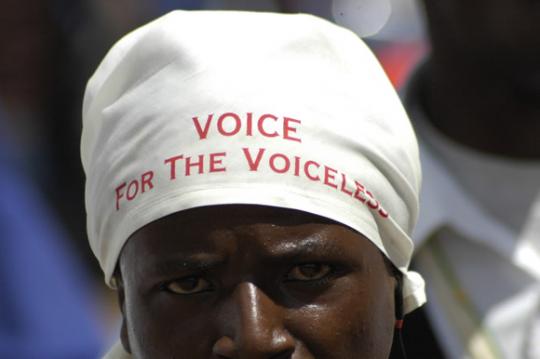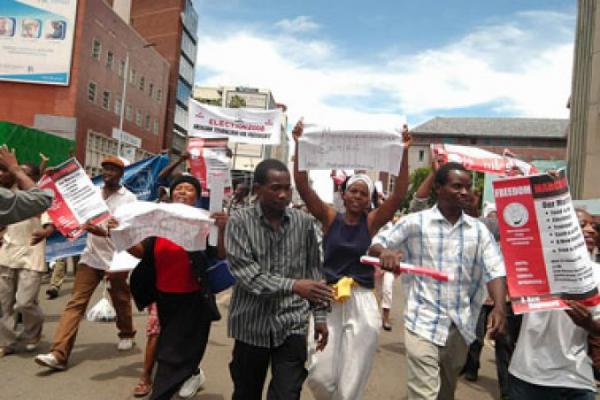Structural adjustment, but worse. It’s the EU’s proposed Economic Partnership Agreements!
Afrosistance | 23 May 2010
Structural adjustment, but worse. It’s the EU’s proposed Economic Partnership Agreements!

Behind the media noise, an under-reported but vitally important discussion is taking place between Europe and Africa, the result of which will affect the lives of millions of African workers, families and children. Over recent months this discussion has gathered in momentum and urgency as the European Union becomes increasingly desperate to secure a deal with African countries to gain access to new markets and resources as it tries to stumble its way out of the global financial crisis.
That’s right, it’s the European Union’s proposed Economic Partnership Agreements (EPAs). Sexy no, important yes.
In essence, EPAs propose a similar set of neo-liberal economic policies as those enforced by the disastrous structural adjustment packages of the 1980s. The liberalisation and deregulation policies enshrined in structural adjustment have retarded African development, led to cutbacks in government provision of social services, and overseen growing inequality on a colossal scale.
In their current form, EPAs will continue this trend and further open up African markets to Europe prematurely, with the result that small and medium-sized African businesses will be priced out of competition by cheaper European imports. Africa can compete globally when its industries are ready; but just as Europe heavily protected its markets during the early stages of industrialisation in the 19th century, so should Africa now.
Yet the relatively narrow few who will benefit from increased exports to Europe are the ones whose voices are being heard over and above the many more who will suffer from European imports and the further increase in unregulated foreign involvement on African soil. Not to mention the staggering loss in political independence and sovereignty that signing the EPAs in their current form would bring to African countries.
Leading the fight against EPAs is the Organisation of African Trade Union Unity (OATUU). A few weeks ago delegations from Africa’s three main union federations – the Ghana Trades Union Congress (GTUC), the Nigerian Labour Congress and the Congress of South African Trade Unions – gathered in Accra to take part in a three-day conference to strengthen trade union solidarity in Africa.
An article from the UK’s national newspaper the Morning Star documents the opening of the conference:
Kicking off proceedings, GTUC general secretary Kofi Asamoah declared that unions are duty-bound to combat the Economic Partnership Agreement (EPA) that the European Union is seeking to foist on Africa.

He predicted that the EPA would “have dire consequences on jobs in our countries, requiring trade unions on the continent to form alliances with other progressive forces in grappling with the challenges.”
Mr Asamoah referred to the “negative structural effects of globalisation on working people in the developing world and in particular the continuing effects of the world financial crisis that struck the heartland of the capitalist world.”
Yash Tandon, a senior adviser to the intergovernmental think-tank South Centre and author of the recent book Development and Globalisation, agrees with Mr Asamoah’s sentiments. According to Mr Tandon, “the EPAs are driven mostly by European interests. It is an asymmetrical negotiation … driven mainly by considerations of power exercised by the EU and by weak African governments that are dependent on economic aid from Europe and access to markets in Europe. It’s a very unequal relationship. “
Mr Tandon advises that instead of looking to European markets, already existing regional African communities (such as SADC, COMESA and the East African Community) should begin harmonizing the facilitation of pan-African trade, transportation and information networks. In his own words, Africa has time. Europe does not.
Afrosistance sees EPAs in their current format as fundamentally damaging to Africa’s future and advocates a 5 point alternative development agenda which would need to be incorporated into EPAs if they’re to benefit African countries:
- Domestic investment should receive more support. The creation of better credit facilities, guarantees and government policies would attract this type of national or regional investment.
- African governments should retain the right to regulate and control foreign investment to be able to discriminate positively in favour of investors that will support and advance African development.
- African countries and the EU must be able to prohibit incentives that undermine environmental and human rights laws and standards to bring an end to the current “race to the bottom”, which has no winner.
- European countries should commit themselves to making their multinationals respect international labour and environmental standards as well as domestic laws in host countries.
- African parliamentarians, affected stakeholders (particularly small and medium-sized African businesses) and civil society need to be better informed and involved in the current negotiations.

The final point is perhaps the most vital of all, as without the informed involvement of those set to suffer the consequences of structural adjustment by another name, the four points that precede it have little chance of being achieved.
If the proposed EPAs are likely to affect you, make it your business to get involved in the discussions, get active, get vocal, and help shape a fairer agreement for a brighter future.





